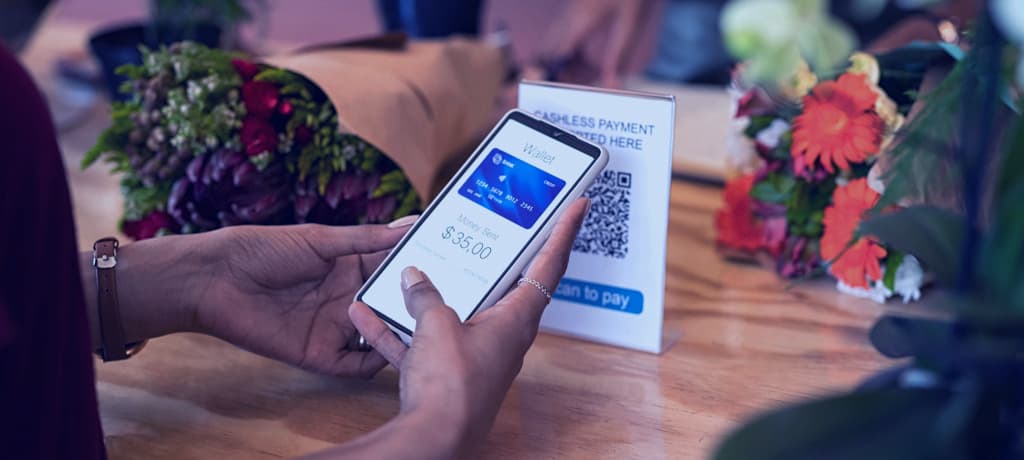Industry guide
Digital and mobile wallets
Securely stores virtual versions of debit cards, credit cards and more for easier payments
On this page
What are digital wallets?
Where a physical wallet is a tangible item used to carry and store valuable items such as cash, credit cards, and identification documents, a digital wallet is an electronic software program that stores and manages various forms of digital currency or financial assets.
Digital wallets store users’ payment information, enabling them to make purchases and track their payment history on any device with a web browser. “Digital wallet” is an all-encompassing term to describe any wallet that exists in digital form, so while the terms “eWallet” and “mobile wallet” are often used interchangeably, they’re slight variations of a digital wallet.
What are mobile wallets?
A mobile wallet is a specific type of digital wallet in which all payment credentials, authentication information and funds are stored on a mobile device.
How do digital wallets differ from digital currency wallets?
A digital currency wallet, referred to as a cryptocurrency wallet or a crypto wallet, is a digital wallet designed specifically to hold public and private cryptographic keys. Public keys enable others to make payments to a user’s wallet, while private keys enable users to make payments using their digital currency.

Digital wallets belong to one of several categories:
- Mobile wallets: Digital wallets that are installed as mobile applications on smartphones or tablets. Mobile wallets enable users to make payments using their devices, usually via near-field communication (NFC) or by scanning QR codes at point-of-sale terminals.
- eWallets: An electronic wallet (eWallet) stores payment card information and facilitates electronic transactions. Popular eWallets such as PayPal or Amazon Pay are mostly used for online transactions and peer-to-peer transfers, though some allow for in-store payments.
- Online wallets: These are web-based digital wallet apps that users can access through internet browsers on their computers or mobile devices. They are often used for online shopping and transactions on eCommerce websites.
- Prepaid wallets: Prepaid wallets are funded in advance, either by transferring money from a bank account or by using cash at designated locations. Users can spend from the prepaid balance until it is depleted, and then they need to reload the wallet.
- Bank-linked wallets: This type is linked directly to a user’s bank account. When making a payment, the amount is deducted directly from the bank balance or charged to the associated credit/debit card.
- Closed wallets: These eWallets are typically tied to specific merchants or services and can only be used for transactions within their ecosystem. Examples of popular closed wallets include Amazon Pay and Starbucks Rewards.
- Open wallets: These enable users to make transactions across various merchants and services, making them more versatile and widely accepted. Examples of popular open wallets include PayPal and Google Pay.

- Cryptocurrency wallets: Cryptocurrency wallets are specifically to store and manage cryptocurrencies. They can be software-based (online or mobile) or hardware (physical devices).
- Peer-to-peer (P2P) wallets: P2P wallets enable users to transfer money directly to friends, family, or acquaintances. They are commonly used for splitting bills, sharing expenses, or sending gifts.
How do digital wallets work?
Whether accessed through desktops, laptops, or mobile devices, all digital wallets store a user’s banking information. This enables the user to store, manage, and transfer digital currency or financial assets.
At a more granular level, different digital wallets use different technologies to function. For example, some use near-field communication to exchange information between mobile or smart devices, while others send a secure magnetic transmission signal to payment terminals or use QR codes to complete the purchase.
What else can digital wallets do?
Though they were initially designed to store payment details and/or banking information, the applications for digital wallets have greatly expanded. Today, many digital wallets can store a wide variety of information, including:
- Gift cards
- Membership cards
- Insurance cards
- Loyalty cards
- Event tickets
- Coupons
- Receipts
- Boarding passes
- Hotel reservations
- ID cards
- Billing statements
- Cryptocurrency
- Spending trackers
As digital wallet technology becomes more advanced over time, many providers have incorporated additional features including tracking expenses, splitting payments, earning membership and loyalty program rewards, or requesting a reimbursement.

What types of transactions do digital wallets support?
Digital wallets support a wide variety of transaction types, including:
- Wallet-to-bank transfers
- Third-party transfers
- Special offers and promotions
- Top-ups
- Cash in/cash out
- Contactless payments
- Secure digital currency storage
- Payment requests
- Bill splits
- Bill payments
- P2P transfers
- Balance and transaction inquiries
- Offline payments
- Cryptocurrency
How popular are digital wallets?
Digital wallets are incredibly popular with consumers. Here are some fast facts:
- The number of digital wallet users is expected to exceed 5.4 billion globally by 2028, according to a study from Juniper Research.
- Another study from Juniper Research estimates that the total value of digital wallet transactions will exceed $16 trillion by 2028.
- Global Market Insights reports that the mobile payments market will reach a record valuation of $3.9 trillion by 2032.
- Statista estimates that digital and mobile wallets accounted for half of all global eCommerce payment transactions in 2023.
- According to the ACI Speedpay Pulse survey, 58% of global mobile wallet users report using their mobile wallet to make a payment at least once a week.
- The 2023 ACI Speedpay Pulse annual report found that 40% of consumers have used a mobile wallet to make any sort of payment, up from 26% in 2020.
5.4 billion
digital wallet users expected by 2028
58%
of global mobile users make a payment at least once a week
40%+
of consumers have used a mobile wallet to make a payment
Are digital wallets safe?
Yes. Most digital wallets incorporate multiple layers of advanced security to ensure the safety of users’ sensitive payment credentials, including but not limited to two-factor and multi-factor authentication, personal identification numbers, tokenization, biometric authentication, and other digital identity services.

What are the benefits of offering digital wallet payments?
Support the payment methods your customers want
Digital wallets give customers the freedom and flexibility to make payments directly from their mobile devices, increasing satisfaction and loyalty in the process.
Offer frictionless payment experiences
Digital wallets empower customers to both make in-store and online payments for a seamless, omnichannel eCommerce experience.
Streamline the checkout process
Eliminating unnecessary payment steps makes it easier for customers to complete purchases, thereby reducing cart abandonment rates.
Enhance customer loyalty programs
Digital wallets enable customers to more easily access and customize their loyalty program profiles, providing them with immediate insights into their rewards and more ways to engage with your brand.
Gather more granular customer insights
By collecting more customer data — specifically, on digital wallet usage and transaction history — you can access more granular insights into their behavior and engage in more nuanced and targeted personalization.
Reduce the risk of fraud
Leveraging advanced security solutions such as tokenization and biometric authentication helps you mitigate fraudulent activity and chargebacks.
Eliminate the hassle of updating customer cards
Digital wallets securely store customers’ payment details for easy renewal, even if their card is lost, stolen, or expires.
Expand your customer base
The dynamic nature of digital wallets makes it easier to reach more markets and new regions to win over new customers.

What are some of the leading digital wallets in the market today?
Some of the most popular digital wallets by region include:
Europe
Apple Pay
Google Pay
Klarna
Lydia
Lyf Pay
MobilePay
PayPay
Revolut
Skrill
Swish
Twint
Vipps
North America
Apple Pay
Cash App
Google Pay
PayPal
Samsung Pay
Venmo
Zelle
South America
DaviPlata
MercadoPago
MODO
NuBank
PayPal
PagSeguro
PicPay
RappiPay
Africa
Airtel Money
EcoCash
M-Pesa
MobiCash
MTN MoMo
Orange Money
Paga
Tigo Pesa
Vodacom M-Pesa
Asia
AliPay
GrabPay
PayTM
PayZapp
PhonePe
Pockets
Samsung Pay
TrueMoney
WeChat Pay
Asia Pacific
Gojek
Kakao Pay
LINE Pay
PayMe
PayPay
RPay
How can merchants benefit from ACI’s digital wallet solution?
ACI Wallets delivers a superior digital wallet experience for merchants and payment service providers. With a single integration, merchants can access over 200 wallets in over 70 countries, offering extensive global coverage across all channels, including eCommerce, mobile applications, and in-store purchases.